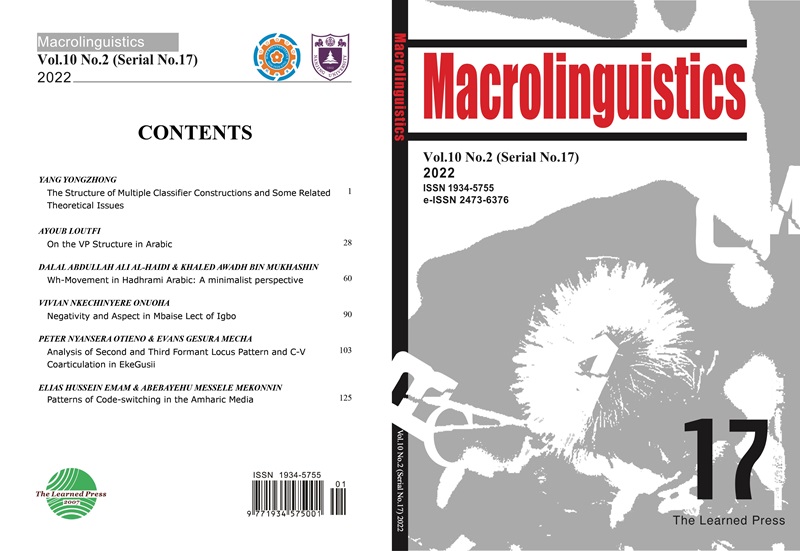Mesquan语的时态、体相、语气和Aktionsart:埃塞俄比亚所说的一种南埃塞俄比亚闪米特语
引用次数: 0
摘要
埃塞俄比亚)摘要:梅斯坎语是一种南埃塞俄比亚闪米特语,主要由埃塞俄比亚古拉奇地区179737个社区的人民在日常信息中使用,他们的语言皮肤没有得到很好的表达。本文的内在愿望是对梅斯坎语的时态、体位、语气和关系艺术结构进行完整的描述。这篇论文很有表现力,因为课程大多担心讲述语言中的真实内容,并且大多依赖于主要的语言事实。2011年至2012年,在四个梅斯坎村庄和梅斯坎Woreda的管理中心Butajira进行了为期12个月的实地调查,这些语言事实,即引发的关于时态、体、语气和aktionsart的语法事实,是由当地母语者组成的。舌头中的完成体强调动态动词的口语状态的终点,但不完成体与动词的词汇语义有关,当评估它们与静态和动态动词的目的时,这可能是实用的。关于时态,舌头中的过去时和非过去时是通过辅助动词来区分的,不完全方面的动词可以发生在过去和非过去的状态下,即现在或将来。未来时间也可以通过整个未来分组中的预期行为说出。此外,发生在过去并且仍然存在于舌头中的动作在现在完成语中用零语素来标记。关于语气,语言有由动词屈折表达的以主体为导向的语气,以及由边缘结构表达的以说话者为导向的情绪。关于表示言语条件中特定阶段的aktionsart,如周期、规律、aktionsarten,这些都是由边缘结构引起的,即进行性和本文章由计算机程序翻译,如有差异,请以英文原文为准。
Tense, Aspect, Mood and Aktionsart in Mesqan: A South Ethio-Semitic language spoken in Ethiopia
Ethiopia) Abstract : Mesqan is a South Ethio-Semitic tongue which is mainly worn in day-to-day message by a people of 179,737 communities in the Gurage Zone, Ethiopia, whose linguistic skin was not well expressed. The inner aspire of this paper is to offer a complete account of tense, aspect, mood and aktionsart structures of the Mesqan tongue. The paper is expressive in character, as the lessons are mostly worried with telling what is really being in the tongue, and mostly rely on main linguistic facts. The linguistic facts, i.e. the elicited grammatical facts regarding tense, aspect, mood and aktionsart, were composed from local speakers of the tongue during 12 months of fieldwork mannered among 2011 and 2012 in four Mesqan villages and in Butajira, the managerial hub of the Mesqan Woreda. The perfective aspect in the tongue emphasizes the endpoint of the oral state with dynamic verbs, but the imperfective aspect relates with the lexical semantics of the verb, which can be practical when their purposes with stative and dynamic verbs are evaluated. Concerning tense, the past and the non-past tense in the tongue are distinguished by assisting verbs and a verb in the imperfective aspect is able to happen with states in the past and in the non-past, i.e. present or future. Future time can also be uttered by an anticipated act throughout the grouping of the future. In addition, an action happening in the past and still around in the tongue is marked by a zero morpheme in the present perfect. Concerning mood, the language has agent-oriented moods that are articulated by verb inflection, and speaker-oriented moods that are articulated by a periphrastic structure. Regarding aktionsart that denotes a specific phase in a verbal condition, like period, regularity, aktionsarten which are noticeable by periphrastic structures, that is the progressive and the
求助全文
通过发布文献求助,成功后即可免费获取论文全文。
去求助
来源期刊
自引率
0.00%
发文量
83
审稿时长
20 weeks
期刊介绍:
Macrolinguistics (ISSN 1934-5755, e-ISSN 2473-6376) is an international academic journal which is specialized in research papers of non-Indo-European linguistics. It is published biannually by The Learned Press and funded by the Double First-Class Initiative of Nanjing University. It aims at contributing to the complementarity and interaction of linguistic research worldwide.

 求助内容:
求助内容: 应助结果提醒方式:
应助结果提醒方式:


